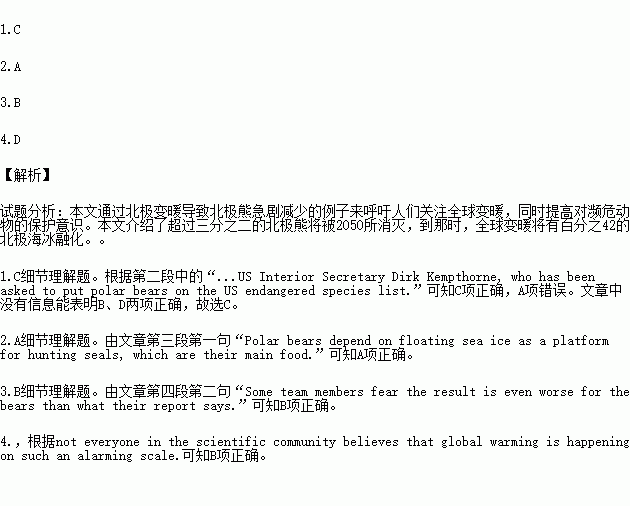题目内容
More than two thirds of the world's polar bears will be wiped out by 2050,according to a shocking new study. By then,scientists say,global warming will have melted 42 percent of the Arctic sea ice. By 2100,only a very few of these important creatures will be left.
The report has been produced by the US Geological Survey. The scientists have publicized their findings in the hope of influencing US Interior Secretary Dirk Kempthorne,who has been asked to put polar bears on the US endangered species list.
Polar bears depend on floating sea ice as a platform for hunting seals,which are their main food. Without enough ice,polar bears would be forced to go onto the land,where they are poorly skilled hunters,and would be unlikely to adapt to the life on the land in time. Experts say few little bears would survive and the stress could make many females unable to get pregnant.
The team of American and Canadian scientists spent six months studying bears,on the ground,from spotter planes and in the lab,using computer models.
Some team members fear the result is even worse for the bears than what their report says. They say the Arctic is warming faster than anywhere in the world and much faster than their computer had been forecasting. Satellite observations have showed that the ice has decreased to an all-time low.
However,not everyone in the scientific community believes that global warming is happening on such an alarming scale. Another investigation has found that polar bears are still being hunted by wealthy “sportsmen” who want their skins and heads. At least ten international companies offer bear-hunting trips.
1.What do we know about Dirk Kempthorne according to the passage?
A.He is an animal scientist.
B.He is a protector of animals working for the US government.
C.He was asked to put polar bears on the US endangered species list.
D.He offered to put polar bears on the endangered species list.
2.Why will polar bears die out if there is not enough sea ice?
A.Because polar bears can't catch enough food without ice.
B.Because polar bears eat ice when they feel thirsty.
C.Because polar bears will be easily found by hunters without ice.
D.Because most female bears are used to giving birth under ice.
3.After a six-month study,some scientists fear that ________.
A.there is something wrong with their computers
B.polar bears will disappear even faster than they ever expected
C.their computer models are not as accurate as they expected
D.global warming will destroy everything in the Arctic
4.What does the writer want to tell us in the last paragraph?
A.The forecast about the future of polar bears is not correct.
B.Global warming won't have any effect on hunting trips in the Arctic.
C.Polar bears are an endangered species as a result of bear-hunting.
D.People don't pay enough attention to the protection of endangered species.
 阅读快车系列答案
阅读快车系列答案
